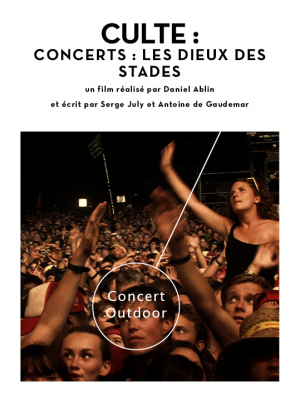CULT! CONCERTS: THE GODS OF THE STADIUMS
| Director | Daniel Ablin |
| Writers |
Serge July & Antoine de Gaudemar |
| Image | Eric Genillier |
| Sound | Thierry Blandin, Joël Flescher, Laurent Maisondieu |
| Editing | Sylvie Crépel |
| Length |
52 mins |
| Format |
HD Cam, 16/9e |
| Version |
french |
| Copyrights |
Folamour – 2014 |
| Broadcaster |
France 5 |
Protagonists :
- Albert KOSKI, promoter
- Edgar MORIN, sociologist
- Pascal NÈGRE, CEO Universal France
- Michka ASSAYAS, author of the “DICTIONARY OF THE ROCK”
- Michael LANG, co-creator of the Woodstock Festival
- Pierre FERRET, architect
- Jean Michel JARRE, composer and scenographer
- Angelo GOPEE, Managing Director Live Nation France
- Jean-Jacques TOUX, programmer of the Vieilles Charrues
- M, Auteur, Composer, Performer
- WILL.I.AM, author, composer, performer
- Laurent GARNIER, composer and DJ
Culture, which was formerly exclusive to elites, is now a powerful, globalized, and massive industry. From best sellers to blockbusters, many creations are now part of the collective imagination. They have achieved cult status. The four-part documentary series “Cult” recounts the fate of four founding productions of this mass popular culture: Mario Bros. and video games, Johnny Hallyday’s first outdoor concert and the giant concerts, Andy Warhol’s Marilyn silk screens and pop art, Dallas and television series.
On June 22nd 1963, at the initiative of Europe n°1 and “Salut les copains”, 250,000 fans gathered together for a concert at the Place de la Nation in Paris, with Johnny Hallyday and the “yéyé” generation. A world premiere that was as eventful as it was unexpected. On August 28 of that year, Bob Dylan and Joan Baez sang their protest songs in front of 250,000 people demonstrating for civil rights in Washington. Western countries are witnessing the arrival of the baby boom generation and the emergence of young people as social actors in their own right.
In the years since, music, from rock to pop and from rap to techno, has been the main vector of expression for young people, the banner of their revolts and aspirations. Singers and musicians have become the new stars, using ever larger arenas for their concerts, especially stadiums, capable of holding ever larger and cross-generational audiences. With the record industry in crisis, live concerts have become the driving force of the music industry. Pop-rock and techno festivals, stadiums, beaches, squares and fields have been used and adapted to host increasingly spectacular shows, which often resemble large pagan and commercial masses.


 EN
EN FR
FR